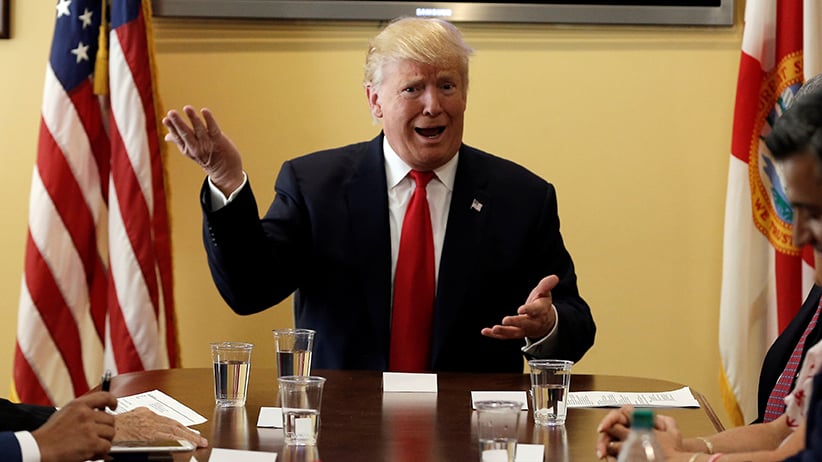What does Trump mean for Canadian taxes?
Canada enjoys a large advantage in corporate tax rates compared to the United States. Under Trump, that could be about to change.
U.S. Republican presidential nominee Donald Trump meets with local small business leaders before a campaign rally in West Palm Beach, Florida, U.S., October 13, 2016. (Mike Segar/Reuters)
Share

In a few short days the United States will inaugurate its 45th president, Donald J. Trump. During the 2016 election campaign Trump talked a lot about lowering taxes. With tax-cutting Republicans also firmly in charge of Congress, it seems very likely our neighbours to the south may soon be seeing lower taxes. What does that mean for Canada? As I see it, the answer is very different for personal taxes and corporate taxes.
On the personal tax front, some (like tax expert Jack Mintz and the Fraser Institute) have expressed concern about the top marginal tax rates in Canada. While the rate facing the highest earners in B.C. remains only 47.7 per cent, the top rate in Ontario, Quebec, and some other provinces now exceeds 50 per cent. In the U.S., the top federal income tax rate is currently 39.6 per cent, but states like California add up to 13.3 per cent more in state income taxes. New York City even has a municipal income tax rate of 3.9 per cent on top of the state and federal taxes. So, it’s not obvious the marginal rates for high-flying top earners is currently much worse in Canada compared to talent-magnet locales such as Silicon Valley or New York City.
Still, if the Trump administration drops tax rates, this balance might change. It’s not clear how much that matters, though. In order to benefit from any emerging tax gap you have to pack up and move to the United States. If you’re considering a move, then it’s not just taxes that govern the choice—you’re swapping one entire social bundle for another. That bundle includes schooling, house prices, safety and security, career growth and opportunity, and the social relations and atmosphere among citizens. Moreover, if those U.S. tax cuts are deficit-financed with hundreds of billions in new debt, it is worth wondering if any tax cuts will really be permanent.
With a Trump presidency, some Canadians may view the change in the bundle of policies and social atmosphere as a net positive compared to Canada. However, there’s a plausible case that many people won’t. Remember the Canadian immigration website breaking down on U.S. election night? Lower taxes may be tempting, but it’s the whole social bundle that matters. This means that Canada need not match U.S. personal tax changes point by point. Canada does need to ensure that we continue to improve Canada as a place people want to live, but that’s about more than just taxes.
On the corporate side, things are different. Up to now, Canada has enjoyed a large advantage in corporate tax rates compared to the United States. This advantage has benefited Canada in many ways, like the incentive for multinational firms to book taxable profit here in Canada rather than in the United States as exemplified by the Burger King head-office move back in 2014. The current U.S. corporate tax rate is 35 per cent federally (with state rates averaging around four per cent more) while the Canadian rate is only 15 per cent (with most provincial rates in the 11 to 12 per cent range). Trump has talked about a plan that gets the U.S. corporate rate down by 20 per cent. If that happens, the corporate tax advantage will shift, costing Canada both tax revenue and corporate investment.
However, more than just the tax rate is on the reform agenda in the United States. There are many tax models being discussed, including some fairly radical changes away from the historical corporate income definition toward models of investment-friendly “cash flow”-style taxation. If the U.S. adopted such a big change, there would be important pressure on Canada to move in the same direction for two reasons. First, the investment disincentives in Canada’s existing system would be emphasized in comparisons to the U.S., and we would lose investment and the jobs that go with it. Second, there may be co-ordination gains for Canada to have a tax system that is compatible with that of our largest trading partner. So, the corporate tax side of any U.S. tax reform is worth watching closely.
For either personal or corporate taxes, the dawn of the Trump administration should not induce Canadian governments to panic. The U.S. legislative process takes time and the final legal product sometimes looks very different from initial proposals. Moreover, any big structural changes will be phased in through time. So, Canada should wait and see rather than take any rash pre-emptive action.
That said, if the U.S. does implement major tax reform, Canada will need to respond—at least on the corporate tax side. It’s never too early to start planning.
Kevin Milligan teaches economics at the Vancouver School of Economics. A disclosure statement is here.